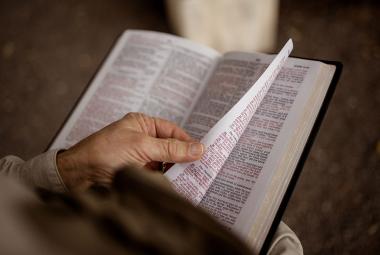For many, the Gospel according to "the Beloved Physician" is the most readable and complete account of the life of Christ. It gives us many features omitted by Matthew and Mark: 20 miracles, of which six are in no other Gospel; and 23 parables, 18 of which we find nowhere else.
There are no "accidents" in Scripture: Luke was chosen by the Holy Spirit. He and Paul were on a very high intellectual level. He wrote the best Greek of any of the New Testament writers. His writings are regarded as some of the finest pieces of historical writing in all of ancient literature.
Sir William Ramsay, a skeptical archaeologist, went into Asia Minor specifically to disprove Luke as an historian. After careful investigation he concluded that Luke had not made one historical inaccuracy. As a result, Sir William Ramsay became a believer. Luke was also a poet; he alone records the lovely songs of Christmas and some of the marvelous parables.
Origin
Some believe that it was Luke that appeared in Paul's vision of the Macedonian beckoner.1 It was from that point on that we encounter the pronoun "we" in Luke's writings, implying that it was at this point that Luke joined Paul and Silas.
A climax in the Book of Acts is Paul's ultimate appeal to Caesar. It was required in such appeals that a written record of the relevant background had to precede the appellant in his appeal to Rome. Some believe that the two volumes of Luke (Luke and its sequel, Acts) were those documents to fulfill that requirement. It is interesting to note that there is a consistent emphasis throughout both volumes that attribute the various civil uprisings as instigated by the Jewish leadership. This would address Rome's primary concern - insurrection and civil unrest - and not the religious aspects. It is also interesting that centurions are always portrayed as "good guys" in Luke's writings!
As a doctor, Luke uses more medical terms than are recorded in the writings of Hippocrates, the "Father of Medicine." It is interesting that he alone records the details of the births of John the Baptist and Jesus. [It is significant that John the Baptist began his ministry when he was about nine inches long and weighed a pound and a half: he was Spirit-filled and jumped for joy while still in Elisabeth's womb! (Luke 1:41-44).]
The Virgin Birth
The blood curse that was pronounced by God on Jeconiah 2 was reviewed in our article "Why a Virgin Birth?". The ostensible paradox of this curse on the royal line of David is unraveled through a careful study of the genealogy in Luke. By presenting the descent through Nathan, the second surviving son of Bathsheba, rather than Solomon, the first surviving son of Bathsheba, we trace the genealogy of Mary - Joseph being the son-in-law (nomizo , "reckoned as by law") of Heli.3
Ministry Mandate
It is Luke that records Jesus announcing His public ministry in the synagogue at Nazareth, by reading His mandate from Isaiah:
The Spirit of the Lord is upon me, because he hath anointed me to preach the gospel to the poor; he hath sent me to heal the brokenhearted, to preach deliverance to the captives, and recovering of sight to the blind, to set at liberty them that are bruised, to preach the acceptable year of the Lord.
Isaiah 61:1-2 as quoted in Luke 4:18-19
And he closed the book, and he gave it again to the minister, and sat down. And the eyes of all them that were in the synagogue were fastened on him. And he began to say unto them, This day is this Scripture fulfilled in your ears.
Luke 4:20-21
What makes this particularly provocative is the portion that Jesus didn't read. If you compare what was read with the passage in Isaiah it was taken from, you find that Jesus stopped at a comma; otherwise, it would have continued:
"...and the day of vengeance of our God."
Isaiah 61:2
This, of course, is deferred until His Second Coming.
It is Luke that links the Triumphal Entry to the prophecy that the Angel Gabriel gave Daniel five centuries earlier.4 (We are indebted to Sir Robert Anderson's classic work, which identified the precise day that was predicted by Gabriel's specifics.5 )
It is Luke that describes the seven-mile Bible study on the Emmaus road on that resurrection afternoon.6 And, of course, Luke's Gospel becomes the natural bridge between the Gospels and the Book of Acts and the ministry of Paul.
It is easy to understand why so many regard this Gospel as their favorite. Have you studied it recently?
Good hunting!
Notes:
- Acts 16:9.
- Jeremiah 22:30.
- Luke 3:23.
- Luke 19:28-44.
- Sir Robert Anderson, The Coming Prince, Kregel Publications, Grand Rapids MI (originally published in 1894). See our Briefing Package, The Seventy Weeks of Daniel, for a detailed study of this most amazing authentication of the deity of Jesus Christ.
- Luke 24:13-33.






